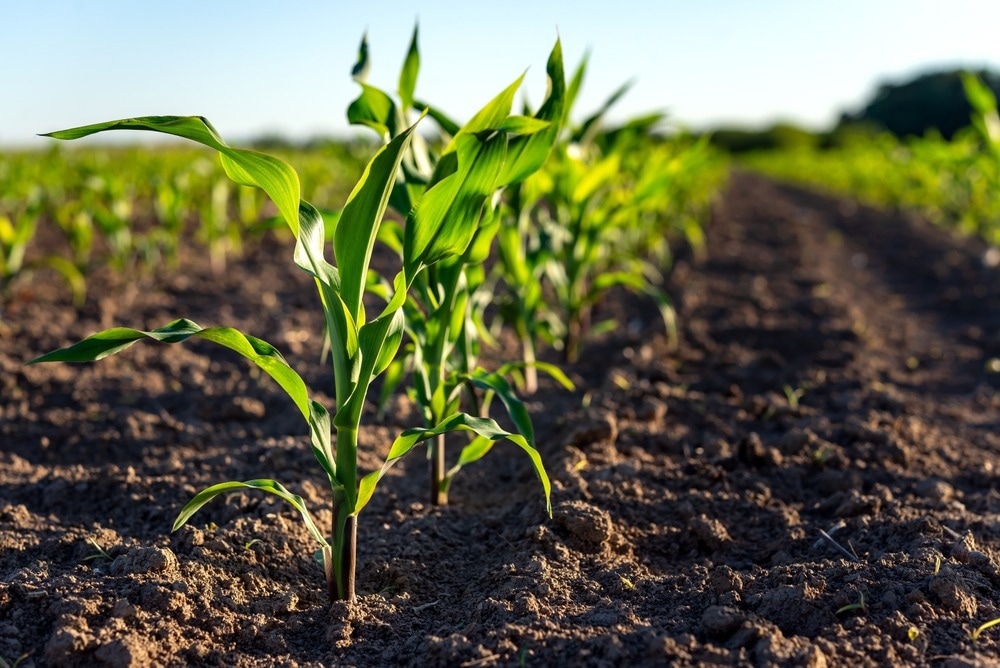Produced in Partnership with Quorum BioFeb 12 2024
We speak with Sudharsan Dwaraknath, CEO of Quorum Bio, a synthetic biology startup developing sustainable agricultural technologies. He delves into the challenges and opportunities in modern agriculture, Quorum Bio's innovative solutions to support farmers, and his thoughts on the future of sustainable farming in the face of climate change.
Please could you introduce yourself and your role at Quorum Bio?
I’m Sudharsan Dwaraknath, co-founder and CEO of Quorum Bio and an Activate Fellow. I’m motivated to work on problems that afflict vulnerable communities and require new technology development. I started Quorum Bio after learning about the effects of climate change on smallholder farmers worldwide.
Who is Quorum Bio and what are its core aims?
We’re a team of Ph.D. scientists inventing microbial tools that equip farmers to increase their bottom line, decrease their environmental footprint, and adapt to climate change. Farmers deserve frontier technologies; we employ cutting-edge synthetic biology advances to engineer low-cost, high-performing microbes that farmers can depend on.

Image Credit: Oh_Apisit39/Shutterstock.com
Could you discuss how climate change influences our current agricultural industry and why this topic is so important?
Growers are facing significant challenges from climate change on two fronts. Firstly, extreme weather events, drought, saltwater intrusion from sea level rise, and emerging crop pests are already causing substantial yield reductions, often by double-digit percentages. Unfortunately, modern farming practices and technologies cannot effectively respond to these escalating challenges.
Secondly, in the global effort to combat climate change and biodiversity loss, farmers are increasingly urged to move away from traditional tools such as chemical pesticides, fertilizers, and conventional tilling methods. It's crucial to acknowledge the intense pressures facing growers and collaborate to provide them with the necessary tools and financial support. This support is essential for securing their livelihoods and ensuring the stability of our global food and agricultural product supplies.
What does it mean to support farmers with technologies that are both economically viable and sustainable? Do you think it is challenging to achieve both?
Much of the general public doesn’t realize that farming is not profitable—most American farms net losses. Farming families are not in it for the money; they farm out of a sense of tradition, duty, and passion. But with input costs rising and climate change increasing risk, farmers are forced to abandon their generations-old craft.
Smallholder farmers around the world are similarly in distress.
In light of this, I feel proud to work on solutions that increase farmers’ profits. And it also presents an opportunity: if a new technology makes farming more sustainable and economical, it has the potential to scale rapidly across billions of acres. That vision keeps us motivated at Quorum.
Given the state of frontier tech today, I don’t think it's technologically challenging. Still, I hope we will learn from the climate crisis and provide more go-to-market support to translate sustainable farming innovations from lab to land before it’s too late.
Could you discuss how Quorum Bio’s technology hopes to address the challenges faced by farmers in the agricultural industry?
We engineer microbes to help crops take up nutrients from the soil and resist climate stress like drought. Our growers will achieve higher yields with less fertilizer, resulting in more profit, less environmental impact, and climate risk mitigation. We can grow microbes inexpensively, so our products will be an easy choice for growers. We’re focused on row crops today, but we can solve for any crop.

Image Credit: Dejan82/Shutterstock.com
We have often heard of our own microbiome; what makes the crop microbiome so interesting, and how could it be a game-changer for sustainable farming?
The ecologist D.H. Janzen said plants “wear their guts on the outside,” referring to how wild plants rely on their microbiomes to acquire nutrients and fight off pathogens, much like we depend on our gut microbiomes.
Conventional farming relies on chemical fertilizers and pesticides for nutrition and disease control, which are extractive when used excessively. Introducing microbes into the mix can flip the script, regenerating the soil. This transition to regenerative farming is game-changing, and certainly, microbes will be a huge piece of the puzzle.
Their lack of consistent performance primarily limits the adoption of microbial fertilizers. Many growers report little to no benefit from products on the market today. We engineer microbes to ensure they perform on every farm, every time.
Specifically, we discover microbes naturally found on our target crops and turn on select plant growth-promoting genes. Without engineering, these genes are tied up in the organism’s complex biology and may not be active when the crop requires. That’s not a product that growers can trust. Our team is working to increase the adoption of biological fertilizers by engineering microbes that growers can depend on. However, most of the plant microbiome has never been engineered before.
To enable our strategy, we first invented a new technology that allows us to engineer diverse plant-associated microbes at low cost and high throughput. As a result, Quorum is positioned to lead the Ag industry in engineered microbial solutions.
In your opinion, what would a sustainable agricultural industry look like?
There are some overarching concepts in agriculture that resonate with me. Firstly, the idea of increasing crop yields is crucial. By doing so, we can reduce the amount of land needed for cultivation and allocate more for conservation. This isn't a far-fetched idea; for instance, the corn yield record in 2023 was more than triple the national average. Such figures hint at the possibilities that innovations, including those in synthetic biology, might unlock in terms of boosting crop productivity.
Then there's precision agriculture, a rapidly evolving field. Soon, farmers will likely employ drones to pinpoint specific areas of their fields that are suffering from pathogen attacks. This targeted approach will enable them to spray only the affected zones, thereby controlling the spread of disease while minimizing pesticide usage. Moreover, the use of specialized microbes from companies like Quorum will allow crops to draw nutrients from the soil more efficiently, reducing the need for fertilizers.
Another important concept is to 'close the loop' in agricultural practices. This means utilizing all agricultural residues productively, recycling nutrients like phosphorus from sewage systems, and moving away from linear resource paths. Implementing such circular economy principles in agriculture could dramatically reduce waste and improve sustainability.
What more needs to be done to reach this vision?
To accelerate these shifts, three things are essential.
First, we need increased investment in late-stage agricultural technology research and development. While the government funds initial lab-scale research and the private sector shows interest in field-tested innovations, there's a noticeable funding gap in the field-trial phase of agricultural innovation.
Second, if the financial risks of transitioning to sustainable farming practices fall solely on farmers, the shift will be painfully slow. Therefore, the emergence of marketplaces that incentivize farmers to adopt conservation practices is a positive and exciting development.
Finally, it's imperative to engage growers as leaders and partners in this transformation. For instance, many American farmers currently feel alienated by terms like “carbon neutral farming.” This alienation dampens their enthusiasm and willingness to take risks on new practices, highlighting a disconnect between the aspirations of environmental restoration and the realities of those who work the land.
Bridging this gap is crucial for meaningful and lasting change in agricultural practices.
What does Quorum Bio hope to achieve in the next few years? Are there any milestones that the team is working towards?
We are currently focused on addressing growers’ challenges around the efficiency and environmental impacts of phosphorus (P) fertilizer.
Phosphorus is a key macronutrient for plants, but less than 20% of the P fertilizer growers apply is available to their crop, while most of it is trapped by the soil in plant-unavailable form. That excess P in the soil leaches into lakes and rivers and causes toxic algae blooms.
So, growers are not getting enough value from their fertilizer and there are environmental consequences. We’ve engineered microbes that convert P in soil into a form that crops can access. With our technology, growers will get more P into their crops using less fertilizer. Already, dramatic results on corn and rice have been observed in the lab.
We are conducting field trials this year and next and hope to put our solution on the market shortly after that for multiple crops. Phosphorus is just the beginning for Quorum.
Our core technology is a high throughput microbial engineering platform – we’re also pointing it towards drought tolerance in cotton, iron deficiency in soybeans, and we are excited to explore other possibilities in the near future.
Where can our readers go to stay up to date with the company’s activities?
Please follow us on LinkedIn and find us at www.Quorum-Bio.com
About Sudharsan Dwaraknath, Ph.D.
 Sudharsan Dwaraknath is co-founder and CEO of Quorum Bio, a venture-backed synthetic biology startup engineering solutions for regenerative and climate-smart farming.
Sudharsan Dwaraknath is co-founder and CEO of Quorum Bio, a venture-backed synthetic biology startup engineering solutions for regenerative and climate-smart farming.
Sudharsan received his Ph.D. in chemistry from the University of Illinois and conducted postdoctoral research in synthetic biology at Lawrence Berkeley National Lab. He has co-authored 12 publications, submitted a patent, and won a Small Business Innovation Research grant from the US Department of Agriculture. Sudharsan is a recipient of the NSF Graduate Research Fellowship and Activate Fellowship for Hard Tech Entrepreneurs.